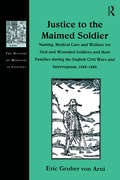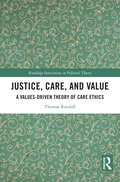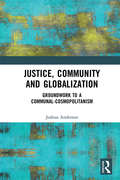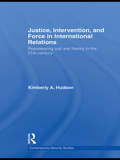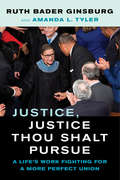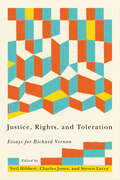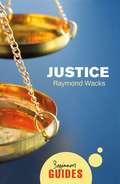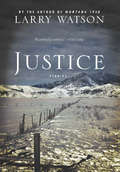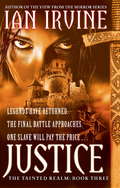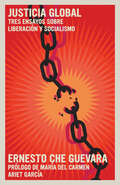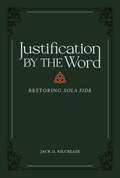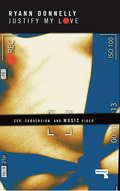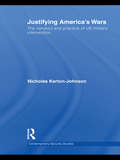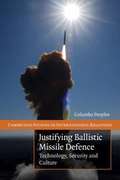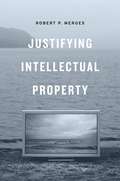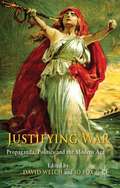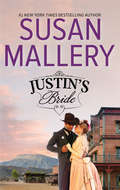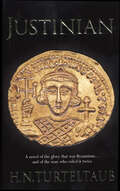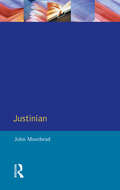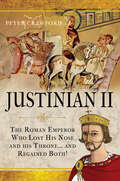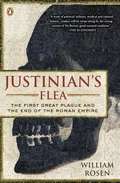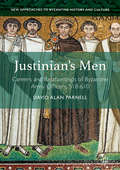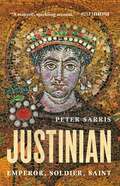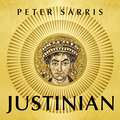- Table View
- List View
Justice to the Maimed Soldier: Nursing, Medical Care and Welfare for Sick and Wounded Soldiers and their Families during the English Civil Wars and Interregnum, 1642–1660 (The History of Medicine in Context)
by Eric Gruber ArniIn the popular imagination, the notion of military medicine prior to the twentieth century is dominated by images of brutal ignorance, superstition and indifference. In an age before the introduction of anaesthetics, antibiotics and the sterilisation of instruments, it is perhaps unsurprising that such a stereotyped view has developed, but to what degree is it correct? Whilst it is undoubtedly true that by modern standards, the medical care provided in previous centuries was crude and parochial, it would be wrong to think that serious attempts were not made by national bodies to provide care for those injured in the military conflicts of the past. In this ground breaking study, it is argued that both sides involved in the civil wars that ravaged the British Isles during the mid seventeenth century made concerted efforts to provide medical care for their sick and wounded troops. Through the use of extensive archival sources, Dr Gruber von Arni has pieced together the history of the welfare provided by both Parliamentarian and Royalist causes, and analyses the effectiveness of the systems they set up.
Justice, Care, and Value: A Values-Driven Theory of Care Ethics (Routledge Innovations in Political Theory)
by Thomas RandallIn Justice, Care, and Value Thomas Randall argues for the radical potential of care ethics as a distinct and preferable theory of distributive justice. Advancing the feminist literature, this book defends a vision of society that can best enable caring relations to flourish. Specifically, Randall proposes a values-driven theory of care ethics that derives normative criteria for evaluating the moral worth of caring relations and their surrounding institutions via a classification of the values of care. They argue that such a theory gives us unique and meaningful solutions to contemporary questions of distributive justice across personal, political, global, and intergenerational domains. In doing so, the book makes significant strides to engage care ethics with the broader moral and political philosophy literature. Topical and interdisciplinary, Randall demonstrates that care ethics has the conceptual resources to ground distributive theories of socialism, territorial and natural resource rights, obligations to future generations, and historic redress. The book will be of great interest to academics, researchers, and students of feminist philosophy, but also of liberalism, political economy, and theories of global and intergenerational justice.
Justice, Community and Globalization: Groundwork to a Communal-Cosmopolitanism
by Joshua AndersonThis book takes up the tension between globalization and community in order to articulate a new theory of global justice. Although the process of globalization is not new, its current manifestation and consequences are. At the same time, there is a growing recognition of the importance of community, identity and belonging. These two facts have generally been understood to be fundamentally in tension, both theoretically and descriptively. This book seeks to resolve this tension, and then draw out the implications for a theory of global justice and an understanding of the value and purpose of community. Importantly, the book argues, not only does an acceptance of the significance of the fact of globalization and the importance of community call for cosmopolitan duties and obligations, but it also calls into question the legitimacy and justification of the traditional nation-state. Aimed primarily at scholars working on issues related to political philosophy, globalization and global justice, the book will appeal to readers in law, politics, philosophy, and sociology.
Justice, Intervention, and Force in International Relations: Reassessing Just War Theory in the 21st Century (Contemporary Security Studies)
by Kimberly A. HudsonThis book analyses the problems of current just war theory, and offers a more stable justificatory framework for non-intervention in international relations. The primary purpose of just war theory is to provide a language and a framework by which decision makers and citizens can organize and articulate arguments about the justice of particular wars. Given that the majority of conflicts that threaten human security are now intra-state conflicts, just war theory is often called on to make judgments about wars of intervention. This book aims to critically examine the tenets of just war theory in light of these changes, and formulate a new theory of intervention and just cause. For Michael Walzer, the leading scholar of just war theory, armed humanitarian intervention is permissible only in cases of genocide, ethnic cleansing, widespread massacres, or enslavement. This book shows why this threshold is too restrictive in light of the progressive shift away from interstate conflict as well as the emerging norms of 'sovereignty as responsibility' and the 'responsibility to protect'. Justice, Intervention and Force in International Relations aims to establish a new, stable foundation for non-intervention and a revised threshold for 'just cause'. In addition, this book demonstrates that over-reliance on the just cause category distorts understanding, analysis, and public discussion of the justice or injustice of resorting to war. This new book will be of much interest to students of ethics, security studies, international relations and international law. Kimberley Hudson is Assistant Professor of Political Science at American International College, and has a Phd in International Relations from Brown University.
Justice, Justice Thou Shalt Pursue: A Life's Work Fighting for a More Perfect Union (Law in the Public Square #2)
by Ruth Bader GinsburgRuth Bader Ginsburg's last book is a curation of her own legacy, tracing the long history of her work for gender equality and a "more perfect Union." In the fall of 2019, Justice Ruth Bader Ginsburg visited the University of California, Berkeley School of Law to deliver the first annual Herma Hill Kay Memorial Lecture in honor of her friend, the late Herma Hill Kay, with whom Ginsburg had coauthored the very first casebook on sex-based discrimination in 1974. Justice, Justice Thou Shalt Pursue is the result of a period of collaboration between Ginsburg and Amanda L. Tyler, a Berkeley Law professor and former Ginsburg law clerk. During Justice Ginsburg's visit to Berkeley, she told her life story in conversation with Tyler. In this collection, the two bring together that conversation and other materials—many previously unpublished—that share details from Justice Ginsburg's family life and long career. These include notable briefs and oral arguments, some of Ginsburg's last speeches, and her favorite opinions that she wrote as a Supreme Court Justice (many in dissent), along with the statements that she read from the bench in those important cases. Each document was chosen by Ginsburg and Tyler to tell the story of the litigation strategy and optimistic vision that were at the heart of Ginsburg's unwavering commitment to the achievement of "a more perfect Union." In a decades-long career, Ruth Bader Ginsburg was an advocate and jurist for gender equality and for ensuring that the United States Constitution leaves no person behind. Her work transformed not just the American legal landscape, but American society more generally. Ginsburg labored tirelessly to promote a Constitution that is ever more inclusive and that allows every individual to achieve their full human potential. As revealed in these pages, in the area of gender rights, Ginsburg dismantled long-entrenched systems of discrimination based on outdated stereotypes by showing how such laws hold back both genders. And as also shown in the materials brought together here, Justice Ginsburg had a special ability to appreciate how the decisions of the high court impact the lived experiences of everyday Americans. The passing of Justice Ruth Bader Ginsburg in September 2020 as this book was heading into production was met with a public outpouring of grief. With her death, the country lost a hero and national treasure whose incredible life and legacy made the United States a more just society and one in which "We the People," for whom the Constitution is written, includes everyone.
Justice, Rights, and Toleration: Essays for Richard Vernon
by Neil Hibbert, Charles Jones, and Steven LecceThe political theory of Richard Vernon has been a guiding light for students of politics for over five decades. From the situated ethics of shared citizenship to the normative character of individuals’ connections to members of other societies and generations, Vernon has cleared a distinctive course in his contributions to the many complex dimensions of political morality.Justice, Rights, and Toleration centres on the core ideas that animate Vernon’s approcach to political theory. Contributors to this volume – all former students and colleagues of Vernon – offer critical engagement with the fundamental themes threaded throughout the thinker’s work on the perennial political challenges in liberal democratic societies, including the understanding of citizenship and political membership, justice within and between nations and generations, the rights of children and parents, and the idea of toleration. Vernon articulated a clear vision of the nature of these problems as well as a nuanced approach to addressing them, one rooted in the ideas of democratic dialogue and justice. The essays in this volume are a testament to the breadth of the pressing issues on which Vernon’s work continues to advance critical insights.Justice, Rights, and Toleration provides a worthy tribute to the wide range of Richard Vernon’s interests and the inspiration still to be found in his deep yet subtle body of work in political theory.
Justice: A Beginner's Guide (Beginner's Guides)
by Raymond WacksIn this highly topical introduction, Professor Raymond Wacks explains and evaluates the leading theories of justice that have shaped our societies and their legislative and judicial systems, and explores the extent to which fundamental notions like fairness, equality and freedom are reflected in contemporary society. By analysing some of the world&’s most pressing challenges, including terrorism, corruption and migration, Justice: A Beginner&’s Guide shows how these ideas are applied in practice – and how far we still have to go to achieve social justice.
Justice: Stories
by Larry WatsonThe author of Montana 1948 explores the early years of a powerful Western family in these “beautifully written” linked stories (USA Today).Larry Watson’s bestselling novel Montana 1948 was acclaimed as a “work of art,” a prize-winning evocation of a time, a place, and a family (San Francisco Chronicle). Justice is the stunning prequel that illuminates the Hayden clan’s early years, and the circumstances that led to the events of Montana 1948. With the precision of a master storyteller, Watson moves seamlessly through the decades and among the strong and hard-bitten characters that make up the Hayden family, and in the process opens an evocative window on the very heart of the American West.“An engrossing story of love, familial relationships, and secrets . . . re-creates the vivid beauty of Big Sky country.” —Booklist“Filled with rugged prose sometimes as biting as a northern plains wind.” —The Washington Post“Surprises and scenes of dramatic power punctuate the narrative . . . Throughout, Watson writes with ruthless honesty about his characters’ stunted dreams, unpredictable emotions and outbursts of senseless violence, showing once again that he understands not only the West but the untamed hearts that have roamed it.” —Publishers Weekly (starred review)
Justice: Tainted Realm: Book 3 (Tainted Realm #3)
by Ian IrvineTHE FINAL BATTLE - THE ULTIMATE PRICE The once beautiful land of Hightspall is being carved up by warring armies led by figures from out of legend. One army is headed by the charismatic brute, Axil Grandys, and the other by Lyf, resurrected sorcerer-king and Axil's ancient nemesis. Only the escaped slave Tali and her unreliable magic stand in their way - but Tali's gift grows more painful every time she uses it. As the armies converge on the fateful peak of Touchstone, Tali and her ally Rix must find a way to overcome Lyf and prevent Axil from using the Three Spells that will destroy Hightspall for ever.
Justicia Global: Tres ensayos sobre liberación y socialismo (The Che Guevara Library)
by Ernesto Che GuevaraA Spanish-language edition of three speeches on corporate globalism and imperialism by one of the most widely known guerilla fighters, political theorists, and organizers, Che Guevara.In this collection of three speeches, Ernesto Che Guevara offers a revolutionary view of a world in which human solidarity and understanding replace imperialist agression and exploitation. First, in a sharp speech given in Algeria on February 24, 1965 at the Afro-Asia Economic Seminar, Che speaks about the nature of capitalism and the revolutionary struggle that would open the way for a new, socialist society. Guevara's 1965 essay, "Socialism and Man in Cuba," is a milestone in twentieth-century emancipatory social thought. Finally, &“Message to the Tricontinental&” is one of Che&’s more well-known works, which outlines the tactics and strategies that should be followed in revolutionary struggle.This collection of writings merges Che's philosophy, politics, and economics in his all encompassing, coherent revolutionary vision. His ideas and his struggle strike a chord in the current search for global justice.¿Existe una alternativa a la globalización empresarial y al militarismo que asola nuestro planeta? Estas obras clásicas de Ernesto Che Guevara presentan una visión revolucionaria de un mundo diferente en el que la solidaridad humana y la comprensión sustituyen a la agresión y la explotación imperialistas.
Justification by the Word: Restoring Sola Fide
by Jack D. KilcreaseGod's Word creates what he commands In Justification by the Word, Jack D. Kilcrease reintroduces Martin Luther's key doctrine. Though a linchpin of the Reformation, Luther's view of justification is often misunderstood. For Luther, justification is an expression of God's creative Word. To understand Luther on justification, one must grasp his doctrine of the Word. The same God who declared "let there be light"—and it was so—also declares "your sins are forgiven." Justification is an objective reality. It is achieved in Christ's resurrection and received through an encounter with the risen Christ in Word and sacrament. Justification turns us outward, away from our own unsteady feelings and limited understanding, to look to Christ. And the church must preach justification, lest we so easily forfeit the joy of the gospel. Justification by the Word inspires readers to reencounter the radical doctrine of justification by faith alone.
Justify My Love: Sex, Subversion, and Music Video
by Ryann DonnellyAn analysis of sex and gender in music videos, covering everyone from Beyonce to Madonna, Nine Inch Nails to Mykki Blanco.In Justify My Love, Ryann Donnelly explores sex and gender in one of the most widely consumed art forms of our age -- the music video.Through an autobiographical reckoning with the author's life in a band and collaboration with past lovers, and a close analysis of the erotic iconography of music videos, Justify My Love tells the subversive history of this medium, from the inception of MTV in 1981 through to the 2010s.Covering everything from Lady Gaga and Beyonce to Nine Inch Nails and George Michael, Justify My Love shows how subversion became mainstream, and how marginalized voices shaped some of the biggest music videos of the last thirty years.
Justifying America's Wars: The Conduct and Practice of US Military Intervention (Contemporary Security Studies)
by Nicholas Kerton-JohnsonThis book examines the justifications for, and practice of, war by the US since 1990, and examines four case studies: the Gulf War, Kosovo, Afghanistan and Iraq. The author undertakes an examination of presidential speeches and public documents from this period to determine the focal points on which the respective presidents based their rhetoric for war. The work then examines the practice of war in the light of these justifications to determine whether changes in justifications correlate with changes in practice. In particular, the justificatory discourse finds four key themes that emerge in the presidential discourses, which are tracked across the case studies and point to the fundamental driving force in US motivations for going to war. The four key themes which emerge from the data are: international law or norms; human rights; national interest; and egoist morality (similar too, but wider than, 'exceptionalism'). This analysis shows that 9/11 resulted in a radical shift away from an international law and human rights-focused justificatory discourse, to one which was overwhelmingly dominated by egoist-morality justifications and national interest. This book will be of much interest to students of US foreign policy, humanitarian intervention, Security Studies, and IR theory.
Justifying Ballistic Missile Defence
by Columba PeoplesTechnology is championed as the solution to modern security problems, but also blamed as their cause. This book assesses the way in which these two views collide in the debate over ballistic missile defense: a complex, costly and controversial system intended to defend the United States from nuclear missile attacks. Columba Peoples shows how, in the face of strong scientific and strategic critique, advocates of missile defense seek to justify its development by reference to broader culturally embedded perceptions of the promises and perils of technological development. Unpacking the assumptions behind the justification of missile defense initiatives, both past and present, this book illustrates how common-sense understandings of technology are combined and used to legitimate this controversial and costly defense program. In doing so it engages fundamental debates over understandings of technological development, human agency and the relationship between technology and security.
Justifying Genocide: Germany and the Armenians from Bismark to Hitler
by Stefan IhrigAs Stefan Ihrig shows in this first comprehensive study, many Germans sympathized with the Ottomans' longstanding repression of the Armenians and with the Turks' program of extermination during World War I. In the Nazis' version of history, the Armenian Genocide was justifiable because it had made possible the astonishing rise of the New Turkey.
Justifying Intellectual Property
by Robert P. MergesWhy should a property interest exist in an intangible item? In recent years, arguments over intellectual property have often divided proponents—who emphasize the importance of providing incentives for producers of creative works— from skeptics who emphasize the need for free and open access to knowledge. In a wide-ranging and ambitious analysis, Robert P. Merges establishes a sophisticated rationale for the most vital form of modern property: IP rights. His insightful new book answers the many critics who contend that these rights are inefficient, unfair, and theoretically incoherent. But Merges’ vigorous defense of IP is also a call for appropriate legal constraints and boundaries: IP rights are real, but they come with real limits. Drawing on Kant, Locke, and Rawls as well as contemporary scholars, Merges crafts an original theory to explain why IP rights make sense as a reward for effort and as a way to encourage individuals to strive. He also provides a novel explanation of why awarding IP rights to creative people is fair for everyone else in society, by contributing to a just distribution of resources. Merges argues convincingly that IP rights are based on a solid ethical foundation, and—when subject to fair limits—these rights are an indispensable part of a well-functioning society.
Justifying War
by David Welch Jo FoxA new assessment of the debates about Just War in the twentieth and twenty-first centuries, from the imperial wars of the nineteenth century through the age of total war, the evolution of human rights discourse and international law, to proportionality during the Cold War and the redefinition of authority with the ascendancy of terror groups.
Justin's Bride
by Susan MalleryFall back in love with 1800s Kansas in Susan Mallery's fan-favorite tale of love, loss, and redemption. Justin Kincaid is the local bad-boy-turned-sheriff, and now he's got to prove himself to his people and his town. When a saloon girl is murdered, it's up to him to lead the investigation and to find a home for the dead woman's young daughter. But what he hadn't counted on was Megan, the only woman he's ever loved, volunteering to take in the young girl... Megan Bartlett had all but given up on ever seeing Justin Kincaid again when he returned to assume the sheriff's position. And the man who returns--the man with a bitter, mocking smile--is not the man she remembers. But when she notices how tender he is with the orphaned girl, she can't help but see glimpses of the man she fell in love with, and she wonders if life has granted them a second chance after all...
Justinian
by H. N. TurteltaubFrom one of the nation's leading Byzantine scholars comes a fictional look at the vicious reign of Justinian II, Emperor of the Romans in the seventh century and one of history's most desperate and brutal rulers."Electrifying...An artfully styled narrative and painstaking attention to historical detail vivify this mesmerizing account of one of history's most remarkable rulers." --BooklistAt the Publisher's request, this title is being sold without Digital Rights Management Software (DRM) applied.
Justinian (The Medieval World)
by John MoorheadThe reign of Justinian (527--65) was a key phase in the transition from the Roman empire of classical times to the Byzantine empire of the Middle Ages. Justinian himself, born of peasant stock in a provincial backwater, was one of the greatest rulers yet, despite prodigious achievements, he remained an outsider in the sophisticated society of Constantinople. Here, John Moorhead reinterprets Justinian as man and monarch, together with his formidable empress, the ex-actress Theodora, and assesses the evidence from their time for the evolution of a distinctively medieval world.
Justinian II: The Roman Emperor Who Lost his Nose and his Throne and Regained Both
by Peter CrawfordJustinian II became Roman emperor at a time when the Empire was beset by external enemies. His forces gained success against the Arabs and Bulgars but his religious and social policies fuelled internal opposition which resulted in him being deposed and mutilated (his nose was cut off) in 695. After a decade in exile, during which he strangled two would-be assassins with his bare hands, he regained power through a coup d’etat with the backing of the erstwhile Bulgar enemy (an alliance sealed by the marriage of his daughter, Anastasia). His second reign was seemingly harsher and again beset by both external and internal threats and dissension over doctrinal matters. An energetic and active ruler, his reign saw developments in various areas, including numismatics, administration, finance and architecture, but he was deposed a second time in 711 and beheaded. Drawing on all the available evidence and the most recent research, Peter Crawford makes a long-overdue re-assessment of Justinian’s colorful but troubled career and asks if he fully deserves his poor reputation.
Justinian's Flea: The First Great Plague and the End of the Roman Empire
by William RosenThe epic story of the collision between one of nature?s smallest organisms and history?s mightiest empire During the golden age of the Roman Empire, Emperor Justinian reigned over a territory that stretched from Italy to North Africa. It was the zenith of his achievements and the last of them. In 542 AD, the bubonic plague struck. In weeks, the glorious classical world of Justinian had been plunged into the medieval and modern Europe was born. At its height, five thousand people died every day in Constantinople. Cities were completely depopulated. It was the first pandemic the world had ever known and it left its indelible mark: when the plague finally ended, more than 25 million people were dead. Weaving together history, microbiology, ecology, jurisprudence, theology, and epidemiology, Justinian?s Flea is a unique and sweeping account of the little known event that changed the course of a continent. .
Justinian's Men: Careers and Relationships of Byzantine Army Officers, 518-610 (New Approaches to Byzantine History and Culture)
by David Alan ParnellThis book explores the professional and social lives of the soldiers who served in the army of the Byzantine Empire in the sixth century. More than just a fighting force, this army was the setting in which hundreds of thousands of men forged relationships and manoeuvred for promotion. The officers of this force, from famous generals like Belisarius and Narses to lesser-known men like Buzes and Artabanes, not only fought battles but also crafted social networks and cultivated their relationships with their emperor, fellow officers, families, and subordinate soldiers. Looming in the background were differences in identity, particularly between Romans and those they identified as barbarians. Drawing on numerical evidence and stories from sixth-century authors who understood the military, Justinian’s Men highlights a sixth-century Byzantine army that was vibrant, lively, and full of individuals working with and against each other.
Justinian: Emperor, Soldier, Saint
by Peter SarrisA definitive new biography of the Byzantine emperor Justinian Justinian is a radical reassessment of an emperor and his times. In the sixth century CE, the emperor Justinian presided over nearly four decades of remarkable change, in an era of geopolitical threats, climate change, and plague. From the eastern Roman—or Byzantine—capital of Constantinople, Justinian&’s armies reconquered lost territory in Africa, Italy, and Spain. But these military exploits, historian Peter Sarris shows, were just one part of a larger program of imperial renewal. From his dramatic overhaul of Roman law, to his lavish building projects, to his fierce persecution of dissenters from Orthodox Christianity, Justinian&’s vigorous statecraft—and his energetic efforts at self-glorification—not only set the course of Byzantium but also laid the foundations for the world of the Middle Ages. Even as Justinian sought to recapture Rome&’s past greatness, he paved the way for what would follow.
Justinian: Emperor, Soldier, Saint
by Professor Peter SarrisThe definitive life story of the Roman Emperor who shaped modern times.In this groundbreaking new biography of Justinian, Peter Sarris gives us an intimate insight into both the Emperor and the man. We meet a man who from the humblest beginnings, rose to become ruler of much of the known world achieving an almost god-like status. An emperor who infused even the most mundane tasks with spiritual and religious significance. A gifted administrator obsessed with detail. A middle aged lover who fell for a dancing girl and changed the law so he could marry her, ruling with Empress Theodora by his side for over twenty years. A brilliant military strategist who was never a soldier. The challenges he faced - climate change, battles over culture and identity, the first recorded global pandemic -and many of the solutions he found to address them still resonate with us today. And his legacy remains all around us, in the massive building programme of which the most beautiful manifestation is surely Hagia Sophia; in our legal systems through the codification of the Corpus juris civilis; and in our culture and history by making a fundamental contribution to both the formation of Christendom and the emergence of Islam. In this tour de force Peter Sarris shows us that in all his complexity and contradictions Justinian was, in many ways, a very modern Emperor.(P)2023 Hodder & Stoughton Limited
